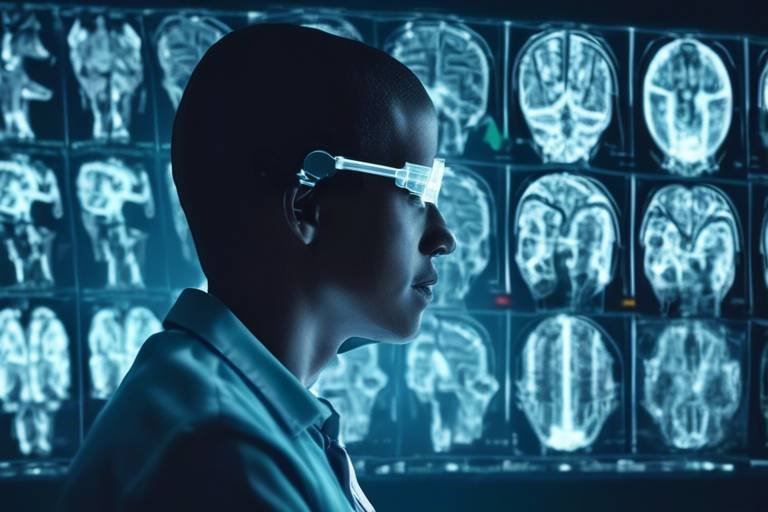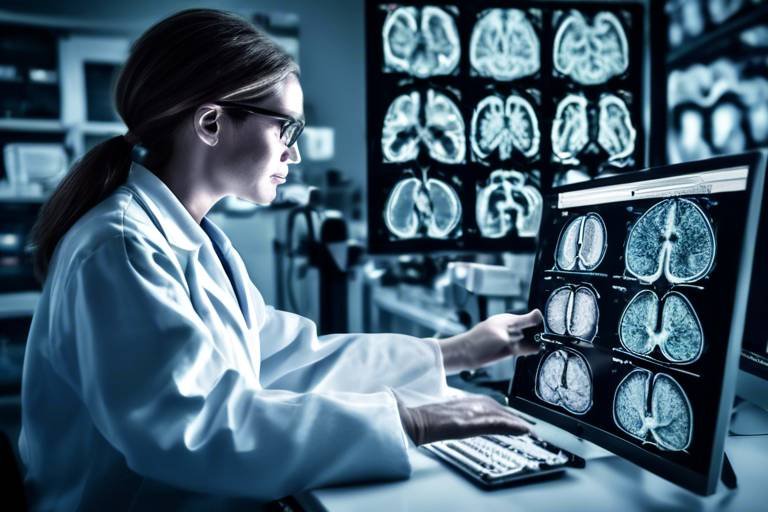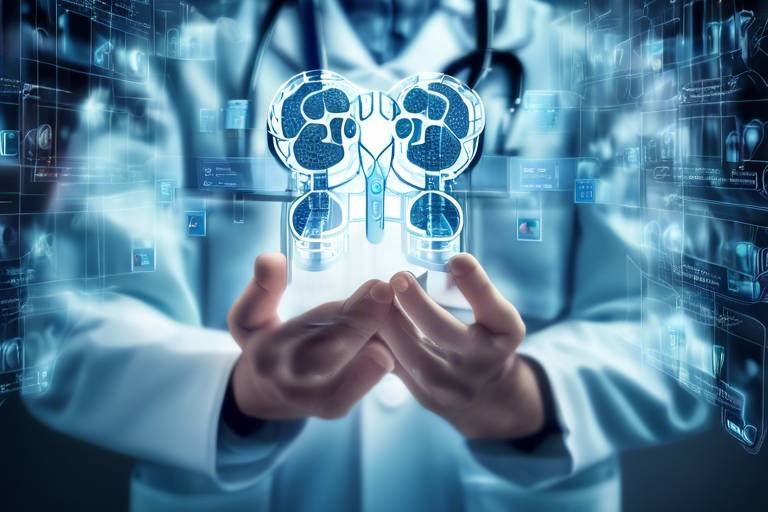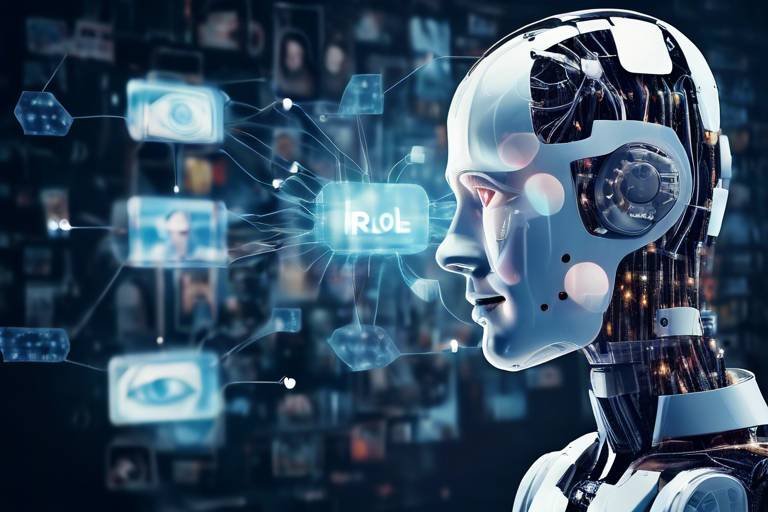How AI is Enhancing Mental Health Diagnostics
In today's fast-paced world, mental health is often overlooked, yet it plays a crucial role in our overall well-being. Enter artificial intelligence (AI), a transformative force that is reshaping the landscape of mental health diagnostics. Imagine a world where mental health assessments are not only quicker but also more accurate, leading to tailored treatment plans that cater specifically to individual needs. This is not just a dream; it's becoming a reality thanks to AI technologies that analyze vast amounts of data and uncover patterns in mental health conditions.
AI's ability to enhance mental health diagnostics is akin to having a personal health assistant who never sleeps. It tirelessly processes information, identifies trends, and provides insights that can significantly improve patient care. For instance, AI algorithms can sift through thousands of patient records, extracting relevant data that helps clinicians make informed decisions. The result? A more precise understanding of a patient's mental health status, which can lead to better outcomes.
Moreover, the integration of AI into mental health diagnostics is not just about speed; it's about depth. By leveraging advanced algorithms, healthcare professionals can access a wealth of information that was previously hidden. This allows for a comprehensive view of a patient's mental health, enabling the development of targeted interventions. Just think about it: instead of relying solely on self-reported symptoms, clinicians can utilize AI to gain a clearer picture of a patient's emotional state. This shift is monumental in ensuring that individuals receive the care they truly need.
As we delve deeper into the world of AI in mental health, it's essential to recognize the various techniques that are driving this innovation. From machine learning to natural language processing, each plays a pivotal role in enhancing diagnostics. Machine learning, for instance, empowers AI to create predictive models that can foresee potential mental health issues, allowing for early intervention. This proactive approach can be likened to catching a cold before it turns into a full-blown flu—it's all about prevention.
Natural language processing (NLP) is another fascinating aspect of AI that allows machines to understand human language. By analyzing patient conversations, NLP can unveil emotional cues that may not be immediately apparent. This technology can help clinicians gain insights into a patient's mental health trends based on their verbal expressions, providing a more nuanced understanding of their condition.
Furthermore, predictive analytics is revolutionizing the way we approach mental health crises. By utilizing historical data, AI can forecast potential issues, enabling healthcare providers to address them before they escalate. Imagine a system that alerts you when you're about to hit a low point, allowing you to take preventive measures. This kind of foresight is invaluable in the realm of mental health.
AI's integration with telehealth services is another game-changer, enhancing accessibility for patients who may otherwise struggle to seek help. With remote diagnostics and ongoing monitoring, individuals can receive timely support from the comfort of their homes. This convenience not only encourages more people to seek help but also ensures that they remain engaged in their treatment journey.
However, as we embrace the potential of AI in mental health diagnostics, we must also acknowledge the challenges that come with it. Issues such as data privacy concerns, the need for robust regulatory frameworks, and the risk of algorithmic bias are significant hurdles that require careful consideration. It's crucial to navigate these challenges thoughtfully to ensure that AI serves as a beneficial tool rather than a potential risk.
In conclusion, the future of AI in mental health diagnostics is bright and filled with promise. Ongoing research is focused on enhancing algorithms and improving user experiences, ultimately expanding access to mental health care for diverse populations. As we stand on the brink of this exciting evolution, one thing is clear: AI is not just a tool; it's a partner in the journey toward better mental health for everyone.
- What is AI in mental health diagnostics? AI refers to the use of advanced algorithms and technologies to analyze data and improve the accuracy and speed of mental health assessments.
- How does machine learning contribute to mental health diagnostics? Machine learning helps develop predictive models that can foresee potential mental health issues, allowing for early intervention.
- What role does natural language processing play? NLP enables AI to interpret and analyze patient conversations, providing insights into emotional states and mental health trends.
- Are there challenges associated with AI in mental health? Yes, challenges include data privacy concerns, the need for regulatory frameworks, and potential algorithmic bias.
- What does the future hold for AI in mental health? Ongoing research aims to enhance algorithms, improve user experience, and expand access to mental health care.

The Role of AI in Mental Health
Artificial Intelligence (AI) is not just a buzzword; it’s a game-changer in the field of mental health diagnostics. Imagine a world where mental health assessments are not just faster but also more precise, leading to tailored treatment plans that cater to individual needs. This is the reality that AI is beginning to create. By harnessing the power of advanced technologies, healthcare professionals are now able to gain insights that were previously unimaginable, ultimately improving patient outcomes and enhancing the overall quality of care.
One of the most significant advantages of AI in mental health is its ability to analyze large datasets quickly. Think about it: mental health conditions are often complex and multifaceted, making them challenging to diagnose. However, AI algorithms can sift through vast amounts of patient data, identifying patterns and correlations that may escape even the most experienced clinicians. This capability not only speeds up the diagnostic process but also increases the accuracy of assessments, ensuring that patients receive the right care at the right time.
Moreover, AI doesn’t just stop at diagnostics; it extends its reach into treatment planning as well. By analyzing data from various sources, such as electronic health records, social media interactions, and even wearable devices, AI can provide healthcare providers with a comprehensive view of a patient's mental health status. This holistic perspective allows for more personalized treatment plans that consider the unique circumstances of each individual. For instance, if a patient shows signs of anxiety through their digital interactions, AI can alert their healthcare provider, prompting timely intervention.
In addition to enhancing diagnostics and treatment, AI also plays a vital role in ongoing patient monitoring. With the integration of telehealth services, patients can receive continuous support without the need for in-person visits. AI-powered tools can track patient progress, analyze their responses to treatment, and even predict potential relapses. This proactive approach not only empowers patients but also alleviates some of the burdens on mental health professionals, allowing them to focus on what they do best—caring for their patients.
However, the journey of integrating AI into mental health is not without its hurdles. While the benefits are clear, there are challenges that need to be addressed, such as ensuring data privacy and overcoming algorithmic bias. As we continue to explore the role of AI in mental health, it is crucial to approach these challenges with a thoughtful mindset. By doing so, we can unlock the full potential of AI, paving the way for a future where mental health care is more accessible, efficient, and effective for everyone.
- How does AI improve mental health diagnostics?
AI enhances mental health diagnostics by analyzing large datasets to identify patterns, leading to faster and more accurate assessments. - What are the benefits of using AI in treatment planning?
AI allows for personalized treatment plans by considering individual patient data, improving the chances of successful outcomes. - Can AI monitor patients remotely?
Yes, AI can track patient progress and predict potential relapses, enabling continuous support through telehealth services. - What challenges does AI face in mental health?
Challenges include data privacy concerns, algorithmic bias, and the need for regulatory frameworks to ensure ethical use.

AI Algorithms and Data Analysis
Artificial Intelligence (AI) is not just a buzzword; it's a game-changer in the realm of mental health diagnostics. By leveraging advanced algorithms and sophisticated data analysis techniques, AI is providing clinicians with tools that enhance their decision-making processes. Imagine having a personal assistant that sifts through mountains of data, identifying patterns and correlations that the human eye might miss. This is precisely what AI does, making it an invaluable ally in understanding complex mental health conditions.
At the heart of this transformation are machine learning algorithms that can analyze vast datasets, ranging from clinical records to social media interactions. These algorithms are designed to learn and improve over time, enabling them to recognize subtle shifts in a patient's mental health status. For instance, researchers have found that certain linguistic patterns in text can indicate a decline in mental well-being. By analyzing these patterns, AI can help clinicians detect early signs of conditions such as depression or anxiety.
Furthermore, the power of AI lies in its ability to process data at lightning speed. Traditional methods of analysis can be time-consuming and often leave room for human error. In contrast, AI can provide real-time insights, allowing healthcare providers to make timely interventions. This capability is particularly crucial in crisis situations where every moment counts. With predictive analytics, AI can forecast potential mental health crises based on historical data, empowering clinicians to take proactive measures before issues escalate.
But how does this all come together? Let’s break it down:
- Data Collection: AI systems gather data from various sources, including electronic health records, wearable devices, and even social media.
- Pattern Recognition: Advanced algorithms analyze this data to identify trends and patterns associated with different mental health conditions.
- Customized Interventions: Insights gained from data analysis enable clinicians to tailor treatment plans to meet individual patient needs.
To illustrate the impact of AI algorithms in mental health diagnostics, consider the following table showcasing the potential benefits:
| Benefit | Description |
|---|---|
| Faster Diagnoses | AI can analyze data quickly, leading to prompt and accurate diagnoses. |
| Personalized Treatment | Data-driven insights allow for tailored treatment plans based on individual patient profiles. |
| Early Detection | Predictive models can identify at-risk individuals before issues escalate. |
| Resource Optimization | AI can streamline processes, allowing healthcare providers to focus on patient care rather than administrative tasks. |
In conclusion, the integration of AI algorithms and data analysis in mental health diagnostics is not just a technological advancement; it's a revolution that promises to enhance patient care significantly. By harnessing the power of AI, clinicians can make informed decisions that lead to better outcomes for individuals struggling with mental health issues. As we continue to explore the potential of AI, it’s clear that the future of mental health diagnostics is not just bright; it’s illuminating.
Q: How does AI improve mental health diagnostics?
A: AI enhances diagnostics by analyzing large datasets to identify patterns and trends, leading to faster and more accurate assessments.
Q: What role do machine learning algorithms play?
A: Machine learning algorithms help develop predictive models that can forecast mental health issues, allowing for early intervention.
Q: Are there any challenges to implementing AI in mental health?
A: Yes, challenges include data privacy concerns, the need for regulatory frameworks, and potential algorithmic biases.
Q: How does AI integrate with telehealth services?
A: AI enhances telehealth by providing remote diagnostics and continuous monitoring, making mental health care more accessible.

Machine Learning Techniques
Machine learning techniques are at the forefront of revolutionizing mental health diagnostics. Imagine having a tool that can sift through mountains of data, identifying subtle patterns that even the most experienced clinicians might overlook. That's the power of machine learning in this field. By utilizing algorithms that learn from data, these techniques can develop predictive models that anticipate mental health issues before they escalate. This is akin to having a crystal ball that not only sees the future but also provides actionable insights to improve patient care.
One of the most exciting aspects of machine learning is its ability to adapt and refine its predictions over time. As it processes more data, it becomes increasingly accurate, much like how a seasoned detective sharpens their skills with each case they solve. This dynamic nature is particularly beneficial in mental health, where conditions can vary widely from person to person. For instance, machine learning can analyze factors such as patient history, demographic information, and even lifestyle choices to create a comprehensive profile that informs personalized treatment plans.
Furthermore, these techniques can identify at-risk individuals by analyzing trends and correlations within large datasets. For example, machine learning models can assess social media activity, biometric data, and even responses from mental health screenings to flag potential crises. This proactive approach allows healthcare providers to intervene early, potentially preventing severe episodes of mental distress. It's like having a safety net that catches you before you fall.
To illustrate the impact of machine learning in mental health diagnostics, consider the following table, which outlines some common techniques and their applications:
| Machine Learning Technique | Application in Mental Health |
|---|---|
| Supervised Learning | Used for classification tasks, such as predicting depression based on historical data. |
| Unsupervised Learning | Helps in clustering patients based on similar traits or symptoms, allowing for tailored interventions. |
| Reinforcement Learning | Optimizes treatment plans by learning from patient responses over time. |
In summary, machine learning techniques are not just enhancing the diagnostic process; they are transforming the entire landscape of mental health care. By providing tools that enable early detection and personalized treatment, these technologies are paving the way for a future where mental health issues can be managed more effectively than ever before. As we continue to explore the depths of machine learning, we can only imagine the potential advancements that lie ahead, bringing hope and healing to countless individuals in need.
- What is machine learning in mental health? - Machine learning refers to the use of algorithms and statistical models to analyze data and make predictions, which can significantly enhance mental health diagnostics.
- How does machine learning improve patient outcomes? - By enabling early detection of mental health issues and personalized treatment plans, machine learning can lead to better management of conditions and improved patient outcomes.
- Are there risks associated with using machine learning in mental health? - Yes, challenges such as data privacy concerns and algorithmic bias must be addressed to ensure ethical and accurate use of machine learning in mental health.

Natural Language Processing
Natural Language Processing (NLP) is a groundbreaking technology that allows artificial intelligence to understand, interpret, and respond to human language in a way that feels natural and intuitive. Imagine having a virtual therapist that can pick up on your emotional cues just from the words you use! This capability is transforming the landscape of mental health diagnostics by providing clinicians with deeper insights into a patient's emotional state and psychological well-being.
At its core, NLP analyzes the verbal and written communication of patients, enabling AI systems to identify patterns and nuances that may indicate underlying mental health issues. For instance, a simple conversation might reveal shifts in mood or recurring themes that suggest anxiety or depression. By processing this information, AI can assist healthcare providers in making more informed decisions regarding treatment plans.
Moreover, NLP can be employed in various ways to enhance mental health diagnostics:
- Sentiment Analysis: This technique evaluates the emotional tone behind a series of words, helping to determine whether a patient is expressing positive, negative, or neutral feelings.
- Keyword Extraction: By identifying key terms and phrases, NLP can highlight significant issues that a patient may be facing, allowing for targeted interventions.
- Conversation Analysis: NLP can analyze the structure and flow of conversations, offering insights into a patient's thought processes and communication style.
One of the most exciting aspects of NLP in mental health is its ability to process large volumes of data from various sources, including social media posts, chat logs, and even voice recordings. This data can be invaluable in identifying trends and changes in mental health across different demographics. For example, researchers can analyze how public sentiment around mental health fluctuates over time, which can inform public health strategies and interventions.
However, while the advantages of NLP are substantial, it's important to address potential challenges. The accuracy of NLP tools can be affected by factors such as language diversity, slang, and cultural context. Ensuring that these systems are trained on diverse datasets is crucial to avoid biases and improve their effectiveness across different populations.
In conclusion, Natural Language Processing is not just a technological advancement; it is a powerful tool that enhances our understanding of mental health. By leveraging the insights gained through NLP, mental health professionals can create more personalized and effective treatment plans, ultimately leading to better patient outcomes.
- What is Natural Language Processing? NLP is a technology that enables computers to understand and interpret human language.
- How does NLP help in mental health diagnostics? NLP analyzes patient conversations to identify emotional states and patterns that can inform treatment.
- Are there challenges associated with using NLP in mental health? Yes, challenges include data privacy, language diversity, and the potential for algorithmic bias.
- What is the future of NLP in mental health? The future looks promising, with ongoing research aimed at improving algorithms and expanding access to mental health care.

Predictive Analytics
Predictive analytics is like having a crystal ball for mental health care. Imagine being able to foresee potential mental health crises before they even unfold! This revolutionary approach utilizes historical data and advanced algorithms to analyze trends and patterns in patient behavior, offering a proactive strategy to mental health management. By examining a range of factors such as previous diagnoses, treatment responses, and even social determinants, predictive analytics can help healthcare providers identify individuals at risk of developing severe mental health conditions.
The beauty of predictive analytics lies in its ability to transform raw data into actionable insights. For instance, if a patient has a history of anxiety episodes triggered by specific stressors, predictive models can highlight these patterns, allowing clinicians to intervene early. This could involve adjusting treatment plans or providing additional resources to help the patient navigate potential challenges. The goal is simple: to intervene before a crisis escalates, much like catching a small fire before it turns into a raging inferno.
Moreover, predictive analytics doesn't just benefit patients; it also equips mental health professionals with the tools they need to make informed decisions. Imagine a doctor who can see a patient's trajectory laid out before them, complete with risk assessments and tailored recommendations. This level of insight not only enhances the quality of care but also fosters a collaborative relationship between patients and providers. When patients feel understood and supported, they are more likely to engage in their treatment plans actively.
However, the implementation of predictive analytics is not without its challenges. Data privacy remains a significant concern, as sensitive information is analyzed to derive insights. Healthcare providers must ensure that they comply with regulations such as HIPAA while leveraging these advanced technologies. Additionally, the accuracy of predictive models is paramount; if the algorithms are flawed or biased, they could lead to misdiagnoses or inappropriate interventions.
In summary, predictive analytics holds immense potential in the realm of mental health diagnostics. With ongoing advancements in technology and a commitment to ethical practices, the future looks bright for this innovative approach. By harnessing the power of data, we can create a mental health landscape that is not only reactive but also proactive, ensuring that individuals receive the support they need before they reach a crisis point.
- What is predictive analytics in mental health? Predictive analytics involves using historical data and algorithms to forecast potential mental health crises and trends, allowing for early intervention.
- How does predictive analytics benefit patients? It helps in identifying at-risk individuals, enabling healthcare providers to intervene before a crisis escalates and tailor treatment plans accordingly.
- Are there any challenges associated with predictive analytics? Yes, challenges include data privacy concerns, the need for accurate algorithms, and potential biases that could affect diagnostic outcomes.
- What is the future of predictive analytics in mental health? The future is promising, with ongoing research aimed at improving algorithms, enhancing user experience, and increasing access to mental health care.

Integration with Telehealth Services
The integration of artificial intelligence (AI) with telehealth services is a groundbreaking development that is reshaping the landscape of mental health care. Imagine being able to access mental health services from the comfort of your own home, with AI technologies providing real-time insights and support. This is not just a futuristic dream; it is becoming a reality today. Telehealth platforms, enhanced by AI, offer a unique combination of accessibility and efficiency, allowing patients to receive timely diagnostics and interventions without the barriers of traditional healthcare settings.
One of the most significant advantages of this integration is the ability to conduct remote diagnostics. Patients can engage in virtual consultations where AI tools analyze their verbal and non-verbal cues, providing clinicians with valuable data to inform their assessments. This capability not only saves time but also reduces the stigma often associated with seeking mental health care, making it easier for individuals to reach out for help. Furthermore, AI can continuously monitor patients' progress and adapt treatment plans based on real-time data, ensuring a personalized approach to mental health management.
Moreover, the convenience of telehealth services means that patients can access care from anywhere, whether they are in a bustling city or a remote area. This is particularly important for individuals who may have mobility issues or live in regions with limited access to mental health professionals. AI-driven telehealth services can bridge these gaps, making mental health care more equitable and accessible to all. For instance, AI chatbots can provide immediate support and resources, guiding patients through their mental health challenges while they await a consultation with a licensed professional.
However, it's essential to recognize that the integration of AI in telehealth is not without its challenges. Issues such as data privacy and the need for regulatory compliance are paramount. Patients must feel confident that their personal information is secure and that their treatment is being handled ethically. As we move forward, it will be crucial for healthcare providers to establish robust frameworks that protect patient data while still leveraging the benefits of AI technology.
In conclusion, the integration of AI with telehealth services is revolutionizing mental health diagnostics and care. It enhances accessibility, personalizes treatment, and provides timely interventions that can significantly improve patient outcomes. As we continue to explore this exciting frontier, the potential for AI to transform mental health care is vast, promising a future where everyone can access the support they need, when they need it.
- What is telehealth? Telehealth refers to the delivery of health care services through digital communication technologies, allowing patients to consult with healthcare providers remotely.
- How does AI improve telehealth services? AI enhances telehealth by providing real-time data analysis, personalized treatment recommendations, and continuous monitoring of patients' mental health.
- Are there risks associated with AI in mental health? Yes, there are risks such as data privacy concerns and the potential for algorithmic bias, which need to be addressed to ensure ethical practices.
- Can AI replace human therapists? While AI can provide valuable support and insights, it is not a replacement for human therapists. Instead, it serves as a complementary tool to enhance mental health care.

Challenges in AI Implementation
While the integration of artificial intelligence (AI) into mental health diagnostics shows immense promise, it is not without its hurdles. One of the most pressing challenges is data privacy. As AI systems require vast amounts of data to function effectively, there is a significant risk of sensitive patient information being compromised. The healthcare sector is already under scrutiny regarding data protection, and the introduction of AI adds another layer of complexity. How can we ensure that patient data remains confidential while still leveraging the power of AI?
Another critical issue is the need for regulatory frameworks. Currently, there is a lack of standardized guidelines governing the use of AI in mental health. This absence can lead to inconsistencies in how AI tools are developed and implemented across different healthcare settings. Without clear regulations, there is a risk that some AI systems may not meet the necessary safety and efficacy standards, potentially putting patients at risk.
Moreover, the potential for algorithmic bias poses a significant challenge. AI systems learn from historical data, which may contain biases reflecting societal inequalities. If these biases are not addressed, they can lead to skewed results, misdiagnoses, and ineffective treatment plans. For instance, if an AI system is trained primarily on data from a specific demographic group, it may not accurately assess or diagnose individuals from other backgrounds. This raises the question: how can we ensure that AI tools are equitable and serve all populations effectively?
To tackle these challenges, it is essential for stakeholders—including healthcare providers, technology developers, and policymakers—to collaborate in creating solutions. This could involve establishing comprehensive guidelines for data handling, developing robust algorithms that actively mitigate bias, and ensuring that all AI applications undergo rigorous testing before deployment. By addressing these challenges head-on, we can pave the way for a future where AI enhances mental health diagnostics safely and equitably.
- What are the main challenges of implementing AI in mental health? The main challenges include data privacy concerns, the need for regulatory frameworks, and the potential for algorithmic bias.
- How can data privacy be ensured when using AI? Implementing strict data protection measures and adhering to regulations can help safeguard patient information.
- Why is algorithmic bias a concern in mental health diagnostics? Algorithmic bias can lead to inaccurate assessments and treatments, particularly for underrepresented groups.
- What role do regulatory frameworks play in AI implementation? Regulatory frameworks provide guidelines that ensure AI tools are safe, effective, and equitable for all patients.

Ethical Considerations
As we dive deeper into the integration of AI in mental health diagnostics, it's crucial to navigate the ethical landscape that accompanies these advancements. The potential for AI to revolutionize how we diagnose and treat mental health conditions is enormous, but with great power comes great responsibility. One of the primary ethical concerns is patient confidentiality. In an era where data breaches are alarmingly common, ensuring that sensitive patient information remains secure is paramount. Patients must feel safe sharing their thoughts and feelings, knowing that their privacy is protected.
Another key consideration is the necessity of informed consent. Patients should be fully aware of how their data will be used, especially when AI algorithms analyze their information. This transparency fosters trust and ensures that patients are not unwittingly participating in studies or treatments without their explicit agreement. Furthermore, it’s essential to address algorithmic bias. If the data used to train AI models is skewed or unrepresentative of the broader population, the resulting diagnoses could be inaccurate, leading to misdiagnosis or ineffective treatment plans. For instance, if an AI model is primarily trained on data from a specific demographic, it may not perform well for individuals outside that group, ultimately widening the gap in mental health care accessibility.
Moreover, there’s a pressing need for regulatory frameworks to govern the use of AI in mental health diagnostics. These regulations should aim to ensure that AI technologies are not only effective but also ethical. Establishing guidelines for the development and deployment of AI tools can help mitigate risks associated with misuse or over-reliance on technology. In this context, the role of mental health professionals becomes even more vital. They must remain actively involved in the diagnostic process, using AI as a tool to enhance their expertise rather than replace it.
In summary, while AI holds remarkable potential for enhancing mental health diagnostics, we must tread carefully. Addressing ethical considerations is not just about compliance; it’s about building a system that prioritizes the well-being of patients. By fostering a culture of transparency, accountability, and inclusivity, we can harness the power of AI to create a more equitable and effective mental health care landscape.
- What are the main ethical concerns regarding AI in mental health? The main concerns include patient confidentiality, informed consent, algorithmic bias, and the need for regulatory frameworks.
- How can we ensure patient confidentiality with AI? Implementing robust data security measures and ensuring that AI systems comply with privacy regulations can help protect patient information.
- Why is informed consent important in AI diagnostics? Informed consent ensures that patients understand how their data will be used and fosters trust in the diagnostic process.
- What is algorithmic bias, and why is it a concern? Algorithmic bias occurs when AI systems produce skewed outcomes due to unrepresentative training data, leading to potential misdiagnoses.
- What role do mental health professionals play in the use of AI? Mental health professionals should remain integral to the diagnostic process, using AI as a supportive tool rather than a replacement for their expertise.

Future Directions for AI in Mental Health
The future of artificial intelligence in mental health diagnostics is not just bright; it's positively dazzling! As technology continues to evolve at an unprecedented pace, we can anticipate a wave of innovations that will redefine how we approach mental health care. Imagine a world where AI not only assists in diagnosing conditions but also plays a pivotal role in ongoing treatment and support. This transformation is on the horizon, and it’s set to bring about a revolution in mental health care delivery.
One of the most exciting directions for AI is the development of more sophisticated algorithms that can understand the nuances of human emotions. As AI systems become better at interpreting emotional cues, they will be able to provide insights that are more tailored to individual patients. For instance, by analyzing speech patterns and facial expressions during virtual consultations, AI could help clinicians understand a patient's emotional state more deeply, leading to personalized treatment plans that resonate with the patient's unique experiences.
Moreover, the integration of AI with wearable technology is another promising frontier. Imagine wearing a device that monitors your physiological responses—like heart rate variability or sleep patterns—and connects with an AI system that analyzes this data in real-time. Such technology could alert both patients and healthcare providers to potential mental health crises before they escalate, allowing for timely interventions. This proactive approach could significantly enhance patient outcomes and provide a safety net for those at risk.
Additionally, as we look to the future, the expansion of AI in mental health diagnostics will likely include a focus on cultural competency. AI systems must be trained on diverse datasets that reflect various cultural backgrounds and experiences. This will ensure that the tools developed are effective across different populations, reducing the risk of bias and improving the accuracy of diagnoses. By embracing this diversity, we can enhance the overall effectiveness of mental health care and make it more inclusive.
However, with all this potential, we must also be vigilant about the ethical implications. As AI becomes more integrated into mental health care, it’s crucial to establish robust regulatory frameworks that protect patient privacy and ensure the ethical use of data. Transparency in how AI systems operate and make decisions will be key to building trust among patients and practitioners alike.
In conclusion, the future of AI in mental health is not just about technology; it’s about enhancing the human experience. By combining advanced algorithms with a deep understanding of human emotions and cultural contexts, we can create a mental health care system that is not only more efficient but also more compassionate. As we continue to explore these exciting possibilities, the ultimate goal remains clear: to improve mental health outcomes for everyone, everywhere.
- What is the role of AI in mental health diagnostics? AI aids in faster and more accurate assessments, helping clinicians develop better treatment plans.
- How does machine learning contribute to mental health? Machine learning creates predictive models that can identify potential mental health issues early on.
- What are the ethical considerations of using AI in mental health? Key concerns include patient confidentiality, informed consent, and algorithmic bias.
- What future advancements can we expect from AI in mental health? We can expect more sophisticated algorithms, integration with wearable tech, and a focus on cultural competency.
Frequently Asked Questions
- What is AI's role in mental health diagnostics?
AI plays a transformative role in mental health diagnostics by enabling quicker and more accurate assessments. It helps clinicians understand complex data patterns, leading to better treatment plans and improved outcomes for patients.
- How do AI algorithms analyze mental health data?
AI algorithms utilize advanced data analysis techniques to sift through vast amounts of information, identifying trends and patterns in mental health conditions. This analysis assists healthcare providers in making informed decisions tailored to individual patient needs.
- What are machine learning techniques in mental health?
Machine learning techniques involve creating predictive models that can foresee potential mental health issues. This allows for early intervention, which is crucial for effective management of mental health conditions.
- How does natural language processing (NLP) contribute to mental health diagnostics?
NLP enables AI to interpret and analyze patient conversations, extracting valuable insights about emotional states. By understanding verbal cues, AI can track mental health trends and offer more personalized care.
- What is predictive analytics in the context of mental health?
Predictive analytics involves using historical data to forecast potential mental health crises. This proactive approach allows healthcare providers to address issues before they escalate, enhancing patient safety and care.
- How does AI integrate with telehealth services?
AI integration with telehealth services improves accessibility and convenience for patients. It enables remote diagnostics and continuous monitoring of mental health conditions, making it easier for patients to receive care from the comfort of their homes.
- What challenges does AI face in mental health diagnostics?
Despite its advantages, AI implementation in mental health diagnostics faces challenges such as data privacy concerns, the need for regulatory frameworks, and the risk of algorithmic bias that could affect diagnostic accuracy.
- What ethical considerations are involved in using AI for mental health?
Ethical considerations include ensuring patient confidentiality, obtaining informed consent, and addressing any biases in algorithms that may impact the accuracy of diagnoses. It's crucial to maintain trust and integrity in patient care.
- What does the future hold for AI in mental health diagnostics?
The future of AI in mental health diagnostics is bright, with ongoing research focused on enhancing algorithms, improving user experience, and expanding access to mental health care for diverse populations. This progress promises to revolutionize how we approach mental health.



















